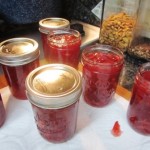Horse Racing, A Dhoti Ceremony, and a Birthday Coming
My hubby and I took a much-need break from the farmette work to celebrate the Fourth of July at the Alameda County Fair. The fair food smelled delicious (funnel cakes, tacos, burgers, barbecue, and baked goods). We’d already eaten a large lunch so we hurried to the grandstand to see the horses.
Where I grew up in rural Missouri, our horses were not as elegant looking as those beautiful race horses. Ours were draft horses, tall and strong and bred for pulling a hay wagon or doing other farm work. I felt a shudder of exhilaration as I watched those race horses take to the track and run like the wind.
Friday and Saturday, we did more farmette chores. On Sunday, we attended a lovely “coming of age” celebration. The event was hosted by our Indian friends whose son and daughter had reached the age marking that milestone. Their son received his first dhoti (a male garment symbolizing his transition from boyhood to manhood) and their beautiful daughter wore for the first time a gorgeous silk sari accessorized with gold jewelry. The affair was presided over by the temple priest and involved the immediate and extended family. Although I chitchatted with everyone, I managed to taste almost every dish offered in the all-vegetarian Indian meal, which was yummy!
Next up on our July social calendar is hubby’s birthday. We so seldom have time off to just kick back and enjoy life that we are planning to relish his big day with a trip to the zoo, a sky ride to see the 360 degree-view of the Bay Area, and dinner at Sotto Mare in San Francisco’s North Beach neighborhood (great Italian seafood). We’d previously planned to take some time off to travel to Spain for this birthday, but he got four new jobs to oversee, ending all hope for that trip this year. Maybe next year.
Today is Monday and we’re back in the workday rhythm of our farmette. There’s a fence to put in so the chickens have a safer area to free-range, a shed that needs more waterproofing and shelves installed, and tons of plums and apricots to pick. These, I’ll dehydrate and make into jam. I’ve got to harvest honey and put supers on the hives, too, so it’s going to be a busy week.
__________________________________________________________________
If you enjoy reading about gardening, farming, keeping of bees and chickens, along with a good mystery and some delicious recipes for home grown goodies, check out my Henny Penny Farmette series of cozy mysteries: A Beeline to Murder, The Murder of a Queen Bee, and A Hive of Homicides (available online or in bookstores everywhere).
Eggstra Confusing Egg Labels
Just because an egg is organic and from a cage-free chicken does not mean the eggs are free from Salmonella Enteritidis (the bacteria that causes the foodborne illness) or that the chickens producing the eggs live free of confinement.
Supermarkets carry dozens of eggs with labels like pasteurized or organic and also free-range, cage-free, or vegetarian. Consumers can find it confusing, so here’s the low-down on eggs and their labels.
CAGE FREE
This term relates to how the chicken is confined. The chickens are not raised in cages but may be confined in barns with floors. The floors may have pine shavings or other material and the chickens will likely have nesting boxes in which to lay eggs and roosts. But cage free does not necessarily mean they have lots of space; they could be living in close confinement with many other birds, depending on the farm.
ORGANIC
In order to get the USDA certification for organic on the eggs, the chickens must not be given hormones, antibiotics, and other drugs. The hens can be caged or otherwise confined, but usually they are cage free and eat an organic diet. The USDA stipulates that to qualify as organic eggs, the layers must be fed an organic diet of grains from land deemed free from toxic chemicals and pesticide for a minimum of three years and no grain from genetically-modified crops.
FREE RANGE
Chickens considered free range are able to leave their confinement and roam freely. Depending on the farm, the birds may be under a protective covering like a canopy. This keeps the flyers from escaping and the hawks from carrying away the birds. Free-range chickens might have a richer diet, again depending on the farm, because of greater access to freely foraging on grasses, grains, and seeds.
VEGETARIAN
How, you might wonder, can a chicken be deemed vegetarian when they naturally forage for grubs and worms? They are confined in cages and fed a vegetarian diet, free of animal and fish by-products.
PASTEURIZED
The eggs containing a pasteurized label have been put through a heating process while still in their shells. For three and one-half minutes, the eggs are heated to 140 degrees Fahrenheit, thereby killing the Salmonella bacteria. Pasteurized eggs are preferable for the diet of young children, elderly people, and those who have weakened immune systems and for whom a salmonella infection might have grave consequences. Even if you don’t buy pasteurized eggs, you can eliminate the risk of Salmonella infection if you cook the egg yolk and white until firm.
SAFETY TIPS
Eggs collected from your hen house should be washed within 36 hours of being collected and immediately refrigerated at 45 degrees Fahrenheit or below. These two steps can reduce the risk of Salmonella. Refrigeration prevents the bacteria (if present) from multiplying. Eggs purchased from the store should be immediately refrigerated. And if a recipe lists a raw egg as an ingredient (for example, mayonnaise or salad dressing or cake frosting), use pasteurized eggs or egg whites.
An egg from a pasture-raised hen is much more nutritious than an egg from a large commercial enterprise, according to Mother Earth News. The publication did a study in 2007 that measured how eggs from pastured hens stack up against the USDA’s nutrient data for commercial eggs. The results suggested that eggs from the pastured chickens were nutritionally superior. For the full story, see, http://www.motherearthnews.com/real-food/tests-reveal-healthier-eggs.aspx
• 1/3 less cholesterol
• 1/4 less saturated fat
• 2/3 more vitamin A
• 2 times more omega-3 fatty acids
• 3 times more vitamin E
• 7 times more beta caroten
It might be time to acquire a few more chickens if you love eggs as much as I do, especially in those big, mid-day farm table breakfast/lunches, with fresh veggies from the garden, and homemade bread and jam.
 Facebook
Facebook Goodreads
Goodreads LinkedIn
LinkedIn Meera Lester
Meera Lester Twitter
Twitter










